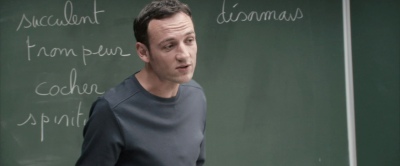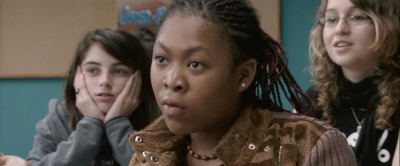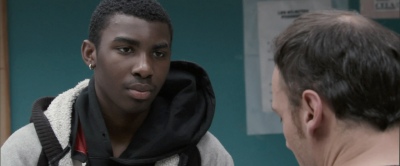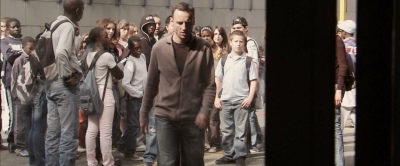| Reviews & Columns |
|
Reviews DVD TV on DVD Blu-ray 4K UHD International DVDs In Theaters Reviews by Studio Video Games Features Collector Series DVDs Easter Egg Database Interviews DVD Talk Radio Feature Articles Columns Anime Talk DVD Savant Horror DVDs The M.O.D. Squad Art House HD Talk Silent DVD
|
DVD Talk Forum |
|
|
| Resources |
|
DVD Price Search Customer Service #'s RCE Info Links |
|
Columns
|
|
|
Class (Entre les murs), The
Sony Pictures // PG-13 // August 11, 2009 // Region 0
List Price: $39.95 [Buy now and save at Amazon]
I'm
sure most anyone reading a plot summary that mentions a teacher in an inner city school is reflexively groaning. I'd hope it'd go without saying that The Class didn't earn its Palme d'Or -- the first French work to win the top prize at the Cannes Film Festival in some twenty years -- by settling into an overly familiar cliché, though. There aren't any scenes of a middle-aged teacher bonding with his students by blaring hip-hop. It never once shoehorns in a tattooed thug baring his sensitive side by reciting Dylan Thomas, and the film doesn't settle for a plucky upstart of an instructor whose brilliant but unconventional methods are met with scowls by a inflexibly rigid school system. That is, for the most part, fantasy...a Hollywood cinematic construction. While most films about teachers toiling away in the inner city amount to little more than hollow sentimentality, The Class is far more grounded in reality, driven to make a statement about identity and bureaucracy rather than cloying stabs at filling the aisles with tear-soaked Kleenexes.
The Class, adapted from François Bégaudeau's semi-autobiographical Entre les murs, was shaped with a daringly experimental approach. The film never once aims its cameras outside the confines of the school, defining its characters wholly through their interactions with each other. As there aren't any glimpses of their lives at home, we see its characters only as others see them. Though there was a script that was loosely followed -- one that was reshaped through a series of improvisational workshops -- it doesn't follow a traditional narrative structure. There is a clear beginning and end, as The Class spans the course of an entire term, but it doesn't concern itself with sweeping character arcs or subplots that slowly simmer throughout the film. The Class furthers its documentary-like approach by not bothering with a score to hammer one emotion or another into the audience. It's a slice of life, really, delving into a school year that on the surface may look rather mundane yet boasts a truth waiting to be revealed. It's an approach that demands a considerable amount of confidence as a filmmaker, and the result is far more rewarding than the formulaic, oversentimental pap of dreck like Freedom Writers.
The
students of The Class don't come across as one-note archetypes. They're complex, wholly believeable people, and the way in which they interact, form cliques, and tease one another is so genuine that I couldn't help but feel intrigued, as far removed as they are from any point of reference I've had. At the same time, I could certainly relate to M. Marin (François Bégaudeau), a French teacher who seeks to understand them but feels as if he's kept at arm's length. Part of the message of The Class is that perhaps a teacher -- particularly a balding, white, and thoroughly French one -- can't hope to fully relate to a group of students this young and diverse. Maybe, despite his best efforts to engage the students in conversations about the material rather than the one-sided delivery of a lesson, some students will never be engaged. There's certainly the possibility that, in the matters of discipline, bureaucracy could stand in the way of doing the right thing. Many of the films that have fielded similar material take a clear stance about these sorts of issues, but The Class chooses instead not to editorialize and is bold enough to suggest that perhaps there are no clear solutions.
High school marks a time as children start to make the uneasy transition into adulthood, struggling to find some sense of identity along the way. It's this element that The Class explores in the greatest detail. This is a multi-ethnic classroom, so not only are these students pitted against the usual hurdles in discovering who they are, but there's the additional complexity of integrating comfortably into French society while still retaining some semblance of their ancestry. It isn't just a matter of how the students view themselves but how they're perceived by others as well. This conflict extends to the teachers too, dismissed by the students as leading insular, empty lives that revolve wholly around the walls of their school. Neither understands the other, and both suffer from some level of frustration because of it. Certainly neither side is portrayed as right either, and throughout the course of the film, Marin inadvertently offends several of his students, he can be overly confrontational, and there's some merit to the argument that he's overindulgent and entirely too tolerant. The Class is less interested in the answers than in establishing the questions, and rooting the film around a teacher who's well-meaning but
imperfect -- and entirely believable in both respects -- is an integral part of that search.
Inspired in part by The Diary of Anne Frank, Marin attempts to get to know his students by having them pen self-portraits, a seemingly routine exercise that's met with very different reactions from the class. The film looks at language as a barrier between teacher and student...between different social groups...between nationalities. By bringing some of the students' parents in for conferences, we catch a brief glimpse of what helped shape the children we'd spent so much time with up to this point. This extends to the film's most dramatic sequences as one student is threatened with expulsion -- and possibly being sent by his family back to an impoverished African village -- after exploding in rage during class.
The Class' unconventional approach is its greatest strength but could leave some viewers feeling uninvolved. It doesn't have a traditional narrative to latch onto, some subplots are either disregarded or only partially resolved, and the film is disinterested in building to a weepy, dramatic crescendo. The Class is a film with quite a bit to say, and rather than sharply and unambiguously carve a message onto the screen, it lays out its thoughts across a 138 minute canvas for its audience to uncover. This is a film that poses questions but would prefer to leave the answers in other hands, and for viewers interested in seeking out a movie that's engaging, unconventional, and certain to spark discussion afterwards, The Class is well-worth discovering on Blu-ray. Recommended.
Video
The Class doesn't present itself as a documentary but certainly looks the part. Shot natively on high definition video, the scope image sports an understated palette, one that reflects the sterility of a classroom lit by overhead fluorescent lights and sunlight beaming in through nearby windows. The digital photography tends to look rather smooth, and The Class is overall somewhat softer than usual for a high definition release. The levels of detail and clarity are unremarkable but immediately identifiable as HD just the same, and its facial and clothing textures in particular are rendered well. I'm uncertain if this dates back to the original digital photography or is a misstep during the AVC encoding, but some fairly heavy artifacting does creep in at times, most glaringly on a maroon door as M. Marin is confronted by another teacher. The Class by design isn't a visually dazzling film, but it certainly benefits enough from the additional resolution and colorspace that Blu-ray offers for it to be worth seeking out in high definition.
Audio
The Class boasts Dolby TrueHD audio in its original French. This, somewhat unconventionally, is a 3.0 soundtrack, shrugging off any LFE or surround effects, and its sound design suits a fairly claustrophobic film so intensely driven by its dialogue. The stereo imaging across the front mains is terrific, fleshing out a reasonably strong sense of motion and directionality. Its dialogue -- rooted in the center channel -- is consistently rendered cleanly and clearly throughout, not marred by so much as a flicker of clipping or distortion. Though this is a rather low-key soundtrack, that seems appropriate given the nature of the film, and I can't muster any complaints about the way The Class sounds on Blu-ray.
A second TrueHD 3.0 track features an English dub, and a Dolby Digital Spanish track has also been included. Subtitles are offered in English (traditional and SDH), French, and Spanish. Owners of constant image height projection rigs should note that the film's English subtitles do spill over into the letterboxing bars.
Extras
The Final Word
The Class is an intriguing experiment, crafted with such supreme confidence that it has no interest in settling for the traditional inspirational teacher formula or repeatedly underscoring some clumsily delivered moral. This isn't a film that settles comfortably into one specific heading or another; it's not a drama, it's not a comedy, it's not a documentary...it draws from each of those yet stands strong as a work very much its own. Some may feel as if they're being kept at arm's length by the lack of a conventional narrative. The Class is a slice of life rather than a series of dramatic beats, several subplots go at least somewhat unresolved, and the film ends without the obligatory "where are they now...?" epilogue. Along with its exploration of identity, The Class' disinterest in convention is a chief aspect of its appeal, and cineastes seeking out something distinctive and unique on Blu-ray ought to find the film to be a rewarding discovery. Recommended.
 |
| [click on the thumbnail to enlarge] |
The Class, adapted from François Bégaudeau's semi-autobiographical Entre les murs, was shaped with a daringly experimental approach. The film never once aims its cameras outside the confines of the school, defining its characters wholly through their interactions with each other. As there aren't any glimpses of their lives at home, we see its characters only as others see them. Though there was a script that was loosely followed -- one that was reshaped through a series of improvisational workshops -- it doesn't follow a traditional narrative structure. There is a clear beginning and end, as The Class spans the course of an entire term, but it doesn't concern itself with sweeping character arcs or subplots that slowly simmer throughout the film. The Class furthers its documentary-like approach by not bothering with a score to hammer one emotion or another into the audience. It's a slice of life, really, delving into a school year that on the surface may look rather mundane yet boasts a truth waiting to be revealed. It's an approach that demands a considerable amount of confidence as a filmmaker, and the result is far more rewarding than the formulaic, oversentimental pap of dreck like Freedom Writers.
The
 |
| [click on the thumbnail to enlarge] |
High school marks a time as children start to make the uneasy transition into adulthood, struggling to find some sense of identity along the way. It's this element that The Class explores in the greatest detail. This is a multi-ethnic classroom, so not only are these students pitted against the usual hurdles in discovering who they are, but there's the additional complexity of integrating comfortably into French society while still retaining some semblance of their ancestry. It isn't just a matter of how the students view themselves but how they're perceived by others as well. This conflict extends to the teachers too, dismissed by the students as leading insular, empty lives that revolve wholly around the walls of their school. Neither understands the other, and both suffer from some level of frustration because of it. Certainly neither side is portrayed as right either, and throughout the course of the film, Marin inadvertently offends several of his students, he can be overly confrontational, and there's some merit to the argument that he's overindulgent and entirely too tolerant. The Class is less interested in the answers than in establishing the questions, and rooting the film around a teacher who's well-meaning but
 |
| [click on the thumbnail to enlarge] |
Inspired in part by The Diary of Anne Frank, Marin attempts to get to know his students by having them pen self-portraits, a seemingly routine exercise that's met with very different reactions from the class. The film looks at language as a barrier between teacher and student...between different social groups...between nationalities. By bringing some of the students' parents in for conferences, we catch a brief glimpse of what helped shape the children we'd spent so much time with up to this point. This extends to the film's most dramatic sequences as one student is threatened with expulsion -- and possibly being sent by his family back to an impoverished African village -- after exploding in rage during class.
The Class' unconventional approach is its greatest strength but could leave some viewers feeling uninvolved. It doesn't have a traditional narrative to latch onto, some subplots are either disregarded or only partially resolved, and the film is disinterested in building to a weepy, dramatic crescendo. The Class is a film with quite a bit to say, and rather than sharply and unambiguously carve a message onto the screen, it lays out its thoughts across a 138 minute canvas for its audience to uncover. This is a film that poses questions but would prefer to leave the answers in other hands, and for viewers interested in seeking out a movie that's engaging, unconventional, and certain to spark discussion afterwards, The Class is well-worth discovering on Blu-ray. Recommended.
Video
The Class doesn't present itself as a documentary but certainly looks the part. Shot natively on high definition video, the scope image sports an understated palette, one that reflects the sterility of a classroom lit by overhead fluorescent lights and sunlight beaming in through nearby windows. The digital photography tends to look rather smooth, and The Class is overall somewhat softer than usual for a high definition release. The levels of detail and clarity are unremarkable but immediately identifiable as HD just the same, and its facial and clothing textures in particular are rendered well. I'm uncertain if this dates back to the original digital photography or is a misstep during the AVC encoding, but some fairly heavy artifacting does creep in at times, most glaringly on a maroon door as M. Marin is confronted by another teacher. The Class by design isn't a visually dazzling film, but it certainly benefits enough from the additional resolution and colorspace that Blu-ray offers for it to be worth seeking out in high definition.
Audio
The Class boasts Dolby TrueHD audio in its original French. This, somewhat unconventionally, is a 3.0 soundtrack, shrugging off any LFE or surround effects, and its sound design suits a fairly claustrophobic film so intensely driven by its dialogue. The stereo imaging across the front mains is terrific, fleshing out a reasonably strong sense of motion and directionality. Its dialogue -- rooted in the center channel -- is consistently rendered cleanly and clearly throughout, not marred by so much as a flicker of clipping or distortion. Though this is a rather low-key soundtrack, that seems appropriate given the nature of the film, and I can't muster any complaints about the way The Class sounds on Blu-ray.
A second TrueHD 3.0 track features an English dub, and a Dolby Digital Spanish track has also been included. Subtitles are offered in English (traditional and SDH), French, and Spanish. Owners of constant image height projection rigs should note that the film's English subtitles do spill over into the letterboxing bars.
Extras
- Audio / Video Commentary (39 min.; SD): In
lieu of a traditional feature-length audio commentary, director Laurent Cantet and writer/actor François Bégaudeau speak over three key scenes. The commentary also periodically cuts away from these segments of The Class over to video of themselves at the editing bay.
[click on the thumbnail to enlarge]
The first of the three scenes -- "The Imperfect of the Subjunctive" (15 min.) -- quickly sets the tone. Cantet and Bégaudeau delve into the rhythm of the performances, deliberately interweaving ambient noise into the film, juggling a sense of humor with the rampant confusion, and the film's emphasis on discussion rather than delivering a rote lesson. The two filmmakers marvel at the young actors playing these students, delve into the use of language as a social marker, and can be somewhat critical of aspects of the film as well.
It's noted that "The Courtyard Dispute" (8 min.) is somewhat reminiscent of Hitchcock's The Birds as upset students swarm M. Marin...the balance of power swaying their way now that he's ventured into their territory. Cantet and Bégaudeau speak about the circular nature of the argument, how intrigued they are that the debate hinges on the interpretation of certain words, and the mix of displeasure and defeat that brings it to an end.
Finally, the two of them speak about the unease pervasive throughout "The Disciplinary Board" (16 min.): the boards' discomfort at so much as being there, a student who puts up a tough façade yet has to translate his mother's praise, and the pointlessness of what presents itself as a dialogue when the outcome is already preordained. Among the other comments over this segment are noting that The Class is ultimately a film about democracy rather than just a school, the ways in which this scene diverges from reality, and how the school's transparent ballot box determined how the scene would be shot.
- Making of The Class (41 min.; SD): This
lengthy look at the production of the film is primarily oriented around behind-the-scenes footage and a series of improv workshops. It's explained that these workshops were used to reshape the script as well as to serve as a testing ground for the material and to assemble the cast. "Making of...' shows Cantet catching the class offguard with a brawl between two actors, delving into the less improvisational approach taken with the film's teachers, and an explanation of the mindset behind the three camera shoot. There are glimpses of alternate takes on several scenes, and we also get to see the cast's reactions as they learn their film has been accepted by the Cannes Film Festival. Footage from both the first screening as well as the cast and crew at Cannes are also highlighted, along with the announcement of its Palme d'Or.
[click on the thumbnail to enlarge]
- Actors' Workshop (30 min.; SD): Additional footage from the series of improv workshops is offered as part of this, the first of two extras exclusive to The Class' release on Blu-ray. Featured here are the cast debating the merits of the self-portrait assignment, an argument that teachers aren't equipped to deal with well-behaved students, Souleymane's certainty that there is some sort of conspiracy against him, the reaction to the board's disciplinary action, and the "not understanding" meeting that closes out the film. There are peeks at several different experiments with dialogue, characters, and situations, including Carl Nanor fielding material for two different characters.
- Actors' Self Portraits (12 min.; SD): Just as the characters of The Class were instructed to pen their self-portraits, so too were the actors themselves. The younger members of the cast speak briefly about themselves -- their backgrounds and what they like and dislike, particularly -- and several of their comments would later be incorporated directly into the film.
- Trailers (HD): A number of high definition trailers, including a clip for The Class, round out the extras.
The Final Word
The Class is an intriguing experiment, crafted with such supreme confidence that it has no interest in settling for the traditional inspirational teacher formula or repeatedly underscoring some clumsily delivered moral. This isn't a film that settles comfortably into one specific heading or another; it's not a drama, it's not a comedy, it's not a documentary...it draws from each of those yet stands strong as a work very much its own. Some may feel as if they're being kept at arm's length by the lack of a conventional narrative. The Class is a slice of life rather than a series of dramatic beats, several subplots go at least somewhat unresolved, and the film ends without the obligatory "where are they now...?" epilogue. Along with its exploration of identity, The Class' disinterest in convention is a chief aspect of its appeal, and cineastes seeking out something distinctive and unique on Blu-ray ought to find the film to be a rewarding discovery. Recommended.
|
| Popular Reviews |
| Sponsored Links |
|
|
| Sponsored Links |
|
|
| Release List | Reviews | Shop | Newsletter | Forum | DVD Giveaways | Blu-Ray | Advertise |
|
Copyright 2024 DVDTalk.com All Rights Reserved. Legal Info, Privacy Policy, Terms of Use,
Manage Preferences,
Your Privacy Choices | |||||||













